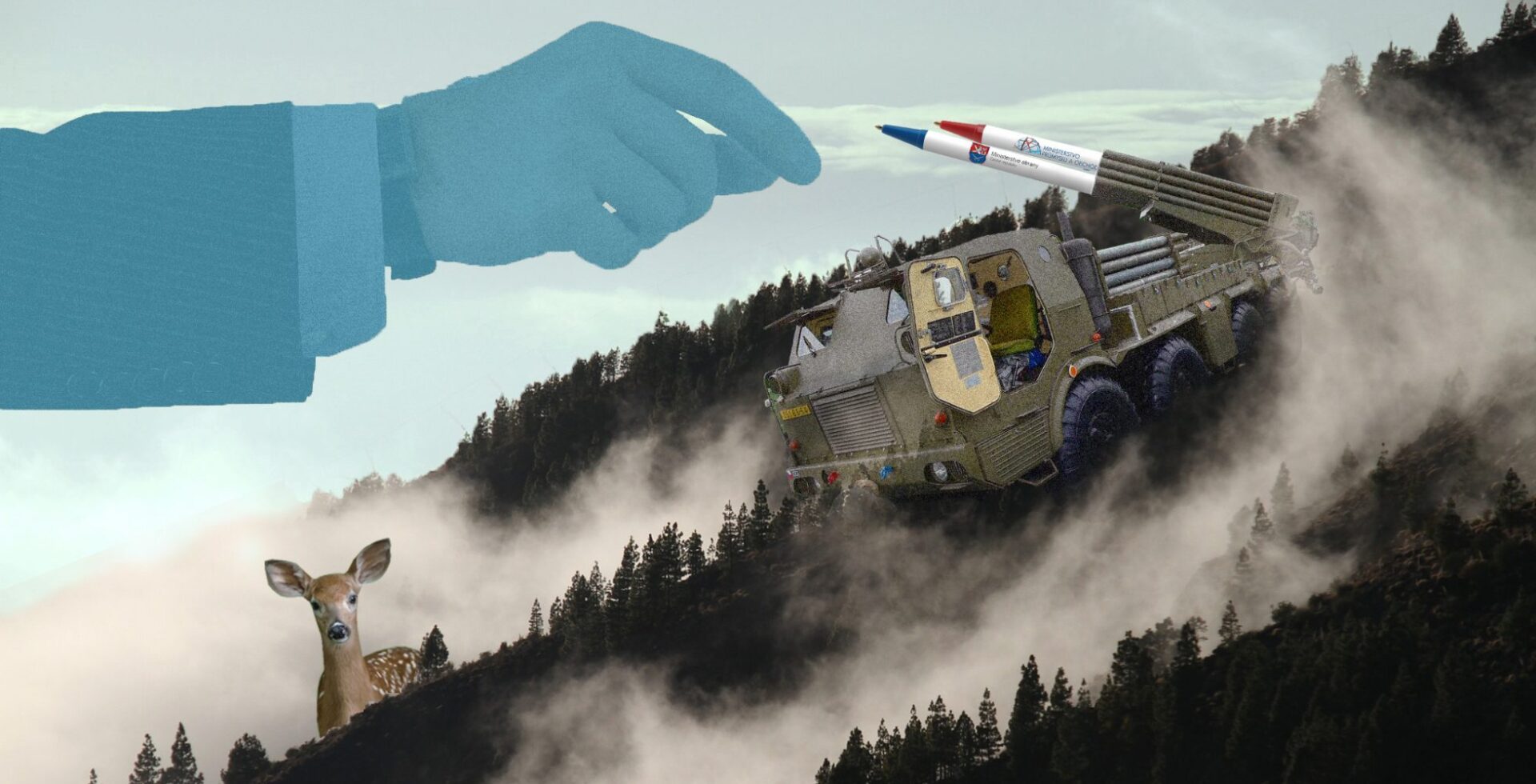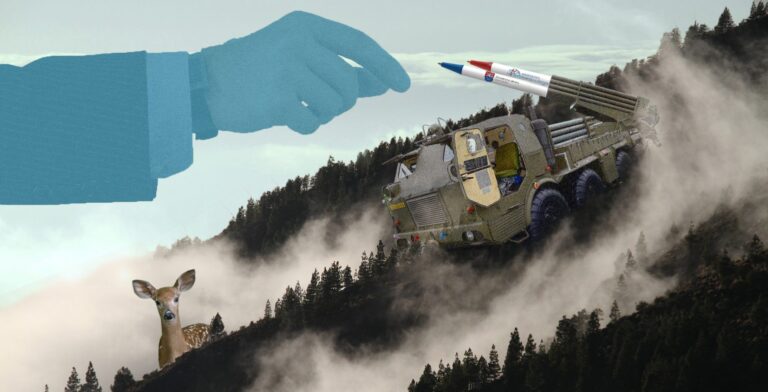Matej Gašparovič (ICJK)
Graphics: Lenka Matoušková 2019-10-10
Matej Gašparovič (ICJK)
Graphics: Lenka Matoušková 2019-10-10
Two years ago, when the Azerbaijani army showed off their Czech Dana howitzers and Vampire rocket launchers in a promotional video, it attracted extraordinary media attention: the Czech Republic does not officially export military equipment to this country. The arms branch of the Czechoslovak Group immediately rushed to make an official statement that, in accordance with its license, it had exported only Tatra chassis. The Czech government also denied any involvement in the export of these howitzers and rocket launchers. But new findings from investigace.cz reporters show that the ministry knew from the start the chassis would be transformed into howitzers and rocket launchers, as well as about their export to Azerbaijan — flouting recommendations from the UN, EU, and OSCE. Leaked documents show that the final modifications of the chassis for combat were made in Slovakia by a company from the same holding that exported the chassis from the Czech Republic.
An “Inappropriate Situation”
In the autumn of 2017, there was a lengthy debate about the export of Czech military equipment: the media described Azerbaijan as embargoed, while arms producers argued that no international embargo was applicable. But what was the actual case? In 1992, Azerbaijan was embargoed by the Organization for Security and Cooperation in Europe (OSCE) and subsequently by the UN because of the country’s war with Armenia in the territory of Nagorno-Karabakh. Ten years later, the UN withdrew its embargo, but the non-binding OSCE embargo was never lifted.
This complicated conflict continues to this day, meaning that the official foreign policy of the Czech Republic does not allow the export of equipment such as howitzers to the area. Defense contractor the Czechoslovak Group even admits this and, according to an official statement, it “respects not only the official arms embargoes of the UN or the EU, but also the unofficial ones, because the foreign policy of the Czech Republic and its allies disallow export to countries that are not embargoed but where the export of military equipment is inappropriate for security reasons, for example.”
This is exactly the “inappropriate” situation that occurred when six Czech howitzers appeared in a promotional video clip posted by the Azerbaijani army.
The video confirmed the presence of Dana howitzers and Vampire rocket launchers of Czech origin in the possession of the Azerbaijani army. In the autumn of 2017, the Czech authorities responsible for issuing licenses for the export of military equipment denied that they would have allowed the delivery of these weapons. According to Hospodářské noviny, the entire trade was to be examined by domestic intelligence services, which, to date, have not issued any known public statements on the subject.
The official explanation at the time was that the contractor had permission to export Tatra chassis to Israel, where they were handed off to a local business partner. Czech authorities claimed that it was unclear to them how the howitzers ended up in Azerbaijan.
According to newly obtained documents, however, the Czech government knew from the beginning that these special Tatra vehicles would be refurbished and upgraded to combat howitzers and rocket launchers and that they would subsequently end up in Azerbaijan.
Czech firm Real Trade Praha and Slovak company MSM Martin — companies that have unsuccessfully pursued the direct export of howitzers and rocket launchers to Azerbaijan in the past — participated in the sale and overhaul. However, both companies, which are owned by defense contractor the Czechoslovak Group owned by the Strnad family, officially deny any involvement in this supply of military equipment.
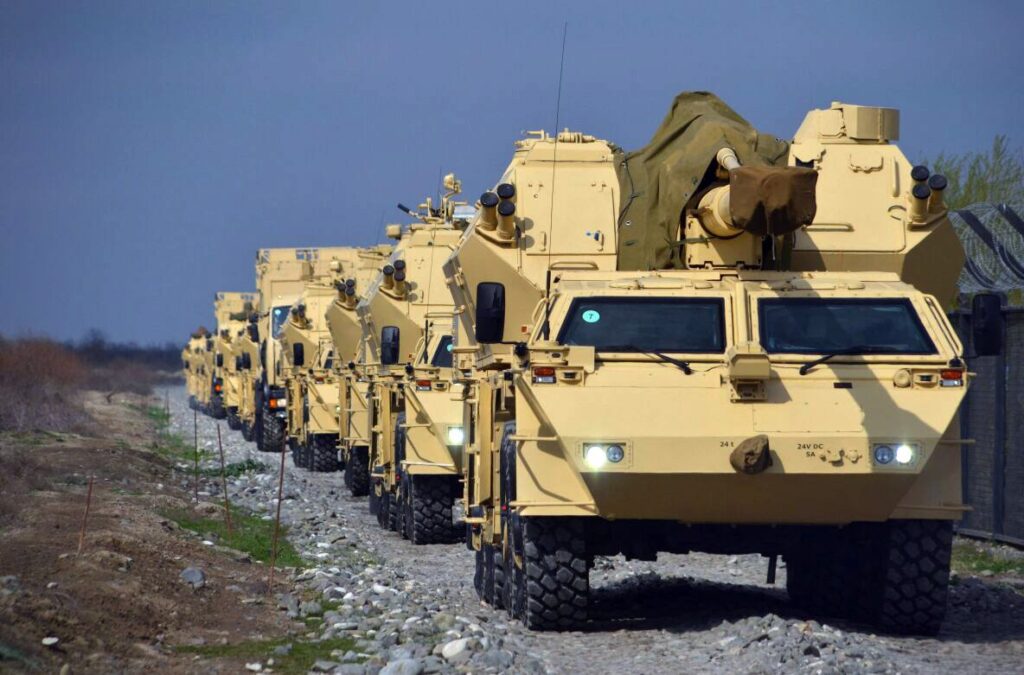
Shipment to Baku
In the Czech Republic, arms export licensing is governed by laws on foreign trade in military equipment. The Czech Ministry of Industry and Trade grants export licenses based on the prior binding opinions of the Ministries of Foreign Affairs, the Interior, and Defense. The first finding is that the Tatra chassis export license granted by the Czech Ministry of Industry and Trade on February 13, 2017, clearly identified the Ministry of Defense of the Republic of Azerbaijan as the end-user of the goods from the outset.
According to the license, Real Trade Praha was to supply a total of 54 Tatra 815 vehicles with armored cabins and “accessories” totaling 482 million CZK in value. They were to be included under the licensed item “tanks and other armored fighting vehicles, motorized, including those fitted with weapons, and components and parts of such vehicles.”
The equipment was not to travel directly from the Czech Republic to the Azerbaijani capital of Baku, but first to Elbit Systems Land and C4i in Israel. However, this company is not featured in the licensing decision as an end-user — the Azerbaijani Ministry of Defense, on the other hand, does from the very beginning. Elbit is listed only as a “consignee.”
And here comes the second interesting finding: what role the Israelis actually played in trade.
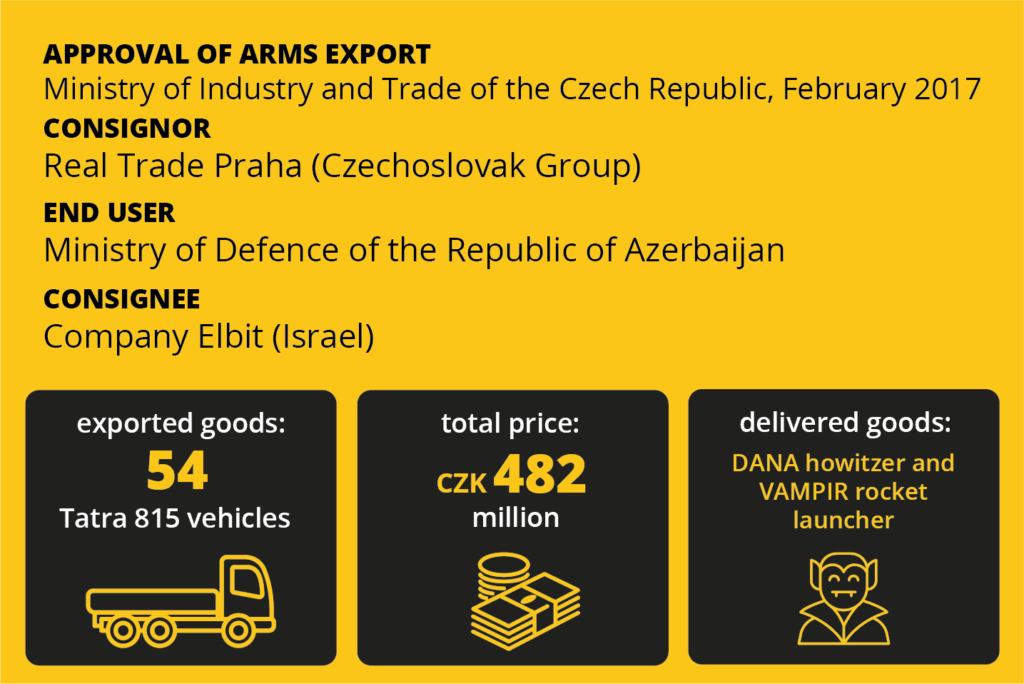
12 Hours in Israel
A partial explanation is provided by documents leaked from the Embassy of Azerbaijan in Bulgaria, which were shared with journalists there by a user of the Anonymous Bulgaria Twitter account.
The embassy staff arranged overflight permissions for Azerbaijan’s state-owned company Silk Way Airlines, whose aircraft, under diplomatic cover, have transported large volumes of military material from European countries — including from the Czech Republic and Slovakia — to the Middle East or Africa.
The diplomatic cover of these flights had two advantages: firstly, it allowed the actual transport of military equipment, which is otherwise prohibited to be transported by civilian aircraft, and, secondly, it prevented the inspection of the transported goods by state authorities such as customs officers.
Investigace.cz reporters found evidence in the leaked documents that Czech Tatra vehicles were also transported on board Silk Way Airlines aircraft twice in May of 2017. The Ilyushin II-76 was loaded on the cold morning of May 10, 2017, at Brno Tuřany airport. Its cargo included two Tatra vehicles: a VP31 and a VPR9 with armored cabins and components, weighing 30 tonnes altogether. They were supplied by Real Trade Praha of the Czechoslovak Group.

The plane with diplomatic cover was scheduled to land in Tel Aviv, Israel, at 2 pm local time. It did not stay there long. Local company Elbit Systems brought the vehicles to its factory and fitted them with communications and control systems and as early as 12 hours later, at three in the morning, the same Ilyushin flew back to Central Europe. It landed in Bratislava on May 11th at 7 am. From there, the modified cargo was handed over to MSM Martin, which, like Czech exporter Real Trade Prague, is owned by the Czechoslovak Group.
The Birth of a Vampire in Slovakia
According to the International Import Certificate issued by the Slovak Ministry of Economy in October of 2016, MSM Martin was expected to import a total of 54 Tatra trucks from Israel’s Elbit Systems over the next six months — the same number exported by its subsidiary, Real Trade Prague, to Israel. The purpose of the import of the goods was, according to the certificate, “the assembly of chassis on goods for sale.”
It was in the Slovak armory that the Tatra vehicles — i.e. chassis, armored cabins and Israeli-supplied communications and control systems — became functional Dana M-1 howitzers and Vampire RM-70 rocket launchers.
This was confirmed to reporters from the Jan Kuciak Investigative Center by the Slovak Ministry of Economy, which provided the reporters with an import certificate and a subsequent export license based on freedom of information laws: “The license was granted to a Slovak company [MSM Martin] for the export of self-propelling howitzers on Tatra chassis (36 pcs) and rocket launchers on Tatra chassis (18 pcs) to Israel. The Ministry of Defense of Israel has officially confirmed the delivery of these goods to Israel. ”
It remained unclear for a long time whether the modernized howitzers and rocket launchers traveled to Azerbaijan (with a layover in Israel) from Slovakia or the Czech Republic.
The Czech export license for 54 Tatra vehicles to Azerbaijan contains a remarkable stipulation: “In the case of a qualitative complaint, it is possible to dispose of defective goods at the end-user site and there remains the possibility of repairing defective goods in the Czech Republic, i.e. the possibility to transport defective goods to the Czech Republic and then re-export them to the end user [Azerbaijan’s Ministry of Defence] after their repair.” This formulation provides the Czech exporter, Real Trade Prague, with the option to export the repaired goods directly to Azerbaijan.
Doubts were dispelled only by the response of the Slovak Ministry of the Economy.
The overhauled and modernized combat vehicles did not stay long with Trenčín-based defense contractor MSM Martin. They traveled back to Israel and, from there, to its end user: Azerbaijan.
The complicated air route taken, during which the chassis became howitzers and rocket launchers, was as follows: Brno, Czech Republic – Tel Aviv, Israel – Bratislava, Slovakia – Tel Aviv, Israel – Baku, Azerbaijan. The demanding logistics and vehicle overhaul involved a Czech arms factory in Šternberk and a Slovak arms factory in Trenčín. Both are owned by companies from the Czechoslovak Group.
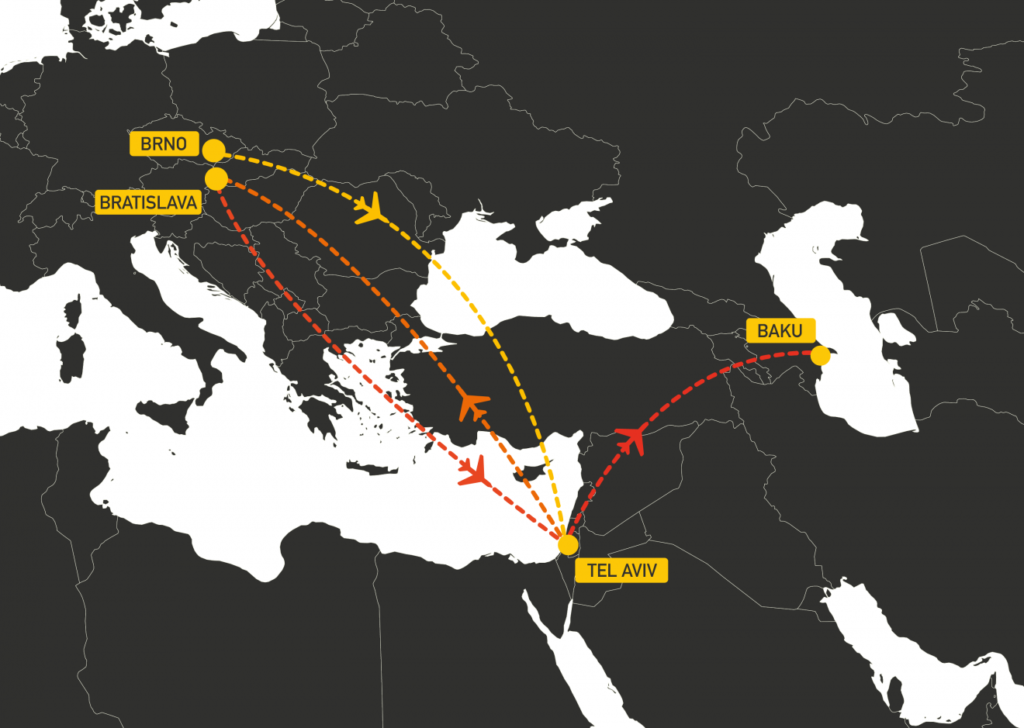
The Missing Piece of the Puzzle
This missing evidence is yet another puzzle piece that helps to map the politically controversial, logistically complicated, and publicly undisclosed export of military equipment from the Czech Republic and Slovakia to Azerbaijan.
The information obtained from these newly acquired documents was also confirmed by an anonymous employee of MSM Martin for the Czech investigative TV show Reportéři ČT in April 2018: “The whole process begins with the import of an old Dana howitzer to be dismantled directly at the company: first, its tower is removed and disassembled, down to the last screw. The chassis is then sent to the Czech Tatra factory in Šternberk, where it is rebuilt.”
This confidential source from the Trenčín armory company MSM Martin then continued: “It takes two to three weeks to rebuild all the parts. Then they are sent back to Slovakia. Meanwhile, the tower’s mechanics are worked on and the whole thing is put together again, followed by a shooting test… Equipment comes in from Elbit in Israel. There are navigation systems, camera systems, and communications systems, so the Danas can communicate with each other.”
In other words, the Israelis were indeed only a connecting piece in the trade of howitzers and rocket launchers between the Czech and Slovak firms from the Czechoslovak Group on the one hand and the Ministry of Defense of Azerbaijan on the other.
Not Chassis, But …
What specific parts of the Tatras were allowed to be assembled as part of their “rebuild” in Slovakia is detailed in the export license granted by the Czech Ministry of Industry and Trade: “The entrepreneur is obliged to treat the other parts of the restricted artillery systems RM-70 and ShKH vz. 77, which are not the subject of this application (in the ShKH vz. 77, these are the breech system, barrel, and barrel pivots, and in the RM-70, these are the rocket pod and its carriage), according to the provisions of the CFE [Treaty on Conventional Armed Forces in Europe] under the supervision of the Department of Disarmament Control, the Capability Planning Division of the Czech Ministry of Defense, and in accordance with the purchase contracts for this material concluded at the Ministry of Defense.”
In this part of the license, officials of the Czech Ministry of Industry and Trade refrain from using the expression “Tatra vehicles” and openly write about “the restricted artillery systems RM-70 and ShKH vz. 77,” i.e. the Vampire rocket launchers and Dana howitzers.
Similarly, the Czech Ministry of Defense commented on this export of goods in its assenting opinion, which investigace.cz obtained under the Freedom of Information Act: “Given that the RM-70 122 mm rocket launchers were used in the manufacture of the Tatra T815 VPR 9 8×8 chassis and that the production of the Tatra T815 VP 31 8×8 chassis involved the ShKH vz. 77 152 mm self-propelled howitzer, which comes from the AČR [Army of the Czech Republic] and are subject to the provisions of the CFE …, the Ministry of Defense requires Real Trade Praha a.s. to be obliged at the time of issue of the license to disclose … the date of export …, including the serial numbers and the country to which they are to be exported.”
Do Not Link Us with Azerbaijan
Reporters from investigace.cz are in possession of an invoice issued by Real Trade Praha on March 21, 2017, to Elbit. The Israelis were to pay $1,660,000 for five Tatras. The documents also include an Israel Import Certificate, dated March 20, 2017, which clearly states that five Tatras were to end up in the hands of the Azerbaijani army.
However, the s insist that they did not supply Baku with howitzers and rocket launchers. “Neither the MSM Group nor any of its subsidiaries have ever delivered any such system to Azerbaijan. At the same time, we deny any allegations linking our company with arms exports to this country,” said Lucia Ollé, the marketing director of a Slovak company owned by Strnad’s Czechoslovak Group last year.
“None of the Czechoslovak Group’s companies, whether based in the Czech Republic or in Slovakia, have ever delivered the military equipment about which you are enquiring or any related components to Azerbaijan,” added company spokesman Andrej Čírtek.
Instead of answering specific questions from investigace.cz, Čírtek reiterated his denial this September, saying that, “just like any firm operating in the defense industry, the [Czechoslovak Group] does not make public any information about licensing procedures.”
This text was financially supported by GACC (The Global Anti-Corruption Consortium) aimed at the Visegrad countries. Member centers Direkt36 and Átlátszo from Hungary, Ján Kuciak Investigative Center from Slovakia, Fundacja Reporterów from Poland and investigace.cz from the Czech Republic are working on the project.

